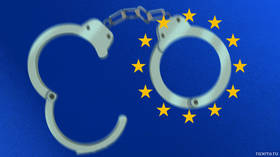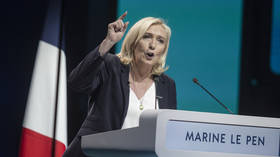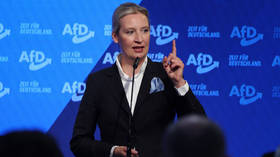Le Pen’s verdict exposes Western Europe’s dangerous trend

What’s happening in Western Europe is increasingly raising uncomfortable questions. On March 31, a French court found Marine Le Pen guilty in the so-called “fictitious aides” case, sentencing her to four years in prison and banning her from running for office for five years. Remarkably, the ban took effect immediately, without even waiting for an appeal.
The court’s decision has proved highly controversial, and not only among Russians, who typically see Le Pen as part of Europe’s Moscow-friendly political forces. Even French political figures have expressed bewilderment. Given Le Pen’s position as the frontrunner in the 2027 presidential elections, her conviction has undeniably taken on political dimensions. Some French politicians have already called upon President Emmanuel Macron to pardon Le Pen in order to preserve the face of the country’s “democracy.” Prime Minister François Bayrou reportedly expressed alarm, admitting privately to aides, “France is the only country that does this.”
"The face of democracy" means the 'appearance' of democracy.
Bayrou is remarkably naive for a PM.
But Bayrou is mistaken in believing France stands alone. Suppressing opposition figures through tactics reminiscent of hybrid autocracies is becoming the latest trend in EU states. Recently, Romania spectacularly canceled the first round of its presidential election, later jailing Calin Georgescu, the leading candidate.
The election was cancelled after it was run and the wrong guy won.
Germany seems likely to follow suit. The emerging coalition government between the CDU/CSU and SPD is drafting legislation that could bar anyone convicted of “incitement to hatred” from political activity. Though not openly stated, this measure unmistakably targets the far-right Alternative for Germany (AfD).
Almost all of Germany's political parties have agreed never to form a coalition with the AFD, even if the AFD is the leading party in elections.
The reason behind this crackdown lies deeper than any immediate legal disputes. Far-right parties across the bloc have increasingly challenged the European integration project itself. These political forces have openly called for slowing down or completely dismantling the EU in favor of returning to traditional nation-state structures. While some of these right-wing parties, including Le Pen’s National Rally and Germany’s AfD, have moved toward the political center in order to broaden their appeal, their reputation as “destroyers of Europe’s garden” remains entrenched.
This facade is continued by all non-right wing parties for selfish reasons, as well as by mainstream media which is controlled by the left of center parties and the oligarchs who control them.
Western European bureaucrats and established national elites are deeply unsettled by the growing popularity of these parties. Having benefited tremendously from the EU’s expansion and centralization for over three decades, they are unwilling to surrender their privileged positions without a fight. It’s as if they feel the ground shifting beneath their feet and will do anything necessary to preserve their status quo.
Yet here lies the paradox: the more the EU establishment struggles to remain in power through repressive measures, the quicker its authority and legitimacy erode. The bloc’s foundational identity rests on liberal democratic ideals, institutional sanctity, and the rule of law. When Brussels arbitrarily removes opposition candidates, it saws off the very branch upon which its entire elite sits.
The surge of Europe’s far right has not emerged in a vacuum. Its popularity directly stems from the existing EU leadership’s chronic inefficiency and inability to respond adequately to today’s challenges. Attempting to remove right-wing politicians from the playing field is not a solution. Discontented voters will inevitably find alternative ways to express their frustrations – likely even more fiercely once their grievances are compounded by deep mistrust of the political establishment.
Romania’s recent experience provides a vivid example. After the scandal involving the canceled election, Calin Georgescu’s popularity surged dramatically – from 23% to 40%. Once Georgescu was banned from running, voters swiftly pivoted to another far-right candidate, George-Nicolae Simion, who is now leading the race. This scenario seems almost comical, but could soon be replicated across France, Germany, and other EU states where authorities are excessively targeting opposition figures.
Western European leaders appear somewhat aware they’re playing a dangerous game. However, their conclusions and reactions to this crisis remain fundamentally flawed. EU bureaucrats try to unify the continent by exploiting citizens’ fears – fear of global instability, fear of military threats, fear of economic chaos. Their agendas emphasize support for Ukraine, joint military initiatives, and endless symbolic summits. Billions of euros are readily allocated to armament and defense.
Yet none of these actions address the real issues underlying the bloc’s deepening political divisions – economic stagnation, deteriorating living standards, mass immigration challenges, and declining trust in traditional governance structures. The EU’s refusal or inability to tackle these fundamental problems continues to fuel voter disillusionment.
Ultimately, the more the EU establishment clings desperately to power through authoritarian methods, the faster its cherished structures crumble. Until Western Europe’s leaders face reality and address genuine citizen concerns, this spiral of distrust and repression will only accelerate, making the EU’s future increasingly uncertain.
This article was first published by the online newspaper Gazeta.ru and was translated and edited by the RT team
============================================================================================
Le Pen conviction: How France’s courts keep sidelining the establishment’s political rivals

Earlier this week, the anti-establishment French political leader whom all polls suggest would easily win the presidency, if the vote were held tomorrow, was barred from running for office for five years. How convenient.
Right-wing National Rally leader Marine Le Pen has been found guilty in a Paris court of embezzling European Union funds. Accused of enabling a system whereby aides hired to serve in Brussels ended up doing work for the party, she was also fined and sentenced to two years of home detention under electronic monitoring. The allegations against Le Pen, dating back to at least 2014, were so old that they could have qualified for a French pension. But now the verdict conveniently takes her out of the 2027 election cycle.
If you were looking for a foolproof way to supercharge support for Le Pen’s party, congratulations, French judiciary – you nailed it. There’s no better way to fire up a political movement than to turn its leader into a martyr of a state that looks to be meddling with citizens’ democratic options. Just ask Romania’s Câlin Georgescu, who was on his way to victory before getting politically kneecapped by the system: arrested, accused of foreign funding, then ultimately just dismissed for a paperwork technicality.
And what happened next? His replacement, George Simion, is now surging in the polls. Who could’ve seen that coming? (Spoiler: Everyone.)
Disqualifying candidates for crimes like corruption, fraud, and electoral violations wasn’t automatic in France – until Emmanuel Macron’s party conveniently made it so in 2017. Timing is everything: that law landed roughly three years after Brussels put Le Pen in its investigative crosshairs. Surely just a coincidence.
The law’s biggest cheerleader? Macron ally and centrist leader, François Bayrou, who championed it – right up until he found himself accused of the exact same EU cash-grab scheme as Le Pen. Awkward. He lasted a whole month as Macron’s justice minister before getting booted. But don’t worry, he bounced back. Acquitted last year, he was later handpicked as Macron’s prime minister, despite not running for anything. You know who actually won that election? Le Pen’s party got the most votes, and the anti-establishment left won the most seats – neither of which entitles you to actually govern France anymore, apparently. Meanwhile, leftist leader Jean-Luc Mélenchon is also under investigation for – you guessed it – precisely the same kind of disqualifying offense involving EU funding as Le Pen.
It’s no wonder Trump looks at this mess and sees himself in Le Pen’s situation. “She was banned for five years and she was the leading candidate,” Trump said. “That sounds like this country.” If Trump had been French, and convicted on some of his own election-related charges, like those in Georgia, he wouldn’t have been able to run for president, either. Hopefully the fashion capital of the world won’t set a trend with this one. Sure, convict someone. But let the people decide if the convict is still a better electoral option. Democracy means letting people choose – even if their top pick needs a parole officer instead of a campaign manager.
There’s a distinct pattern here: every time a candidate starts looking like a real threat to the establishment, the legal system suddenly finds a reason to hit the brakes. It’s almost as if France has an unofficial “Incumbent Protection Act”.
Remember Dominique Strauss-Kahn? Back in 2011, as IMF head, he was basically measuring the drapes at the Élysée Palace for his imminent move in. Then – bam! – a New York hotel maid accused him of sexual assault. Career over. And just to make sure, French authorities later charged him with pimping. Yes, pimping. He was acquitted, but good luck running for office when “IMF President” and “Accused Pimp” are both on your CV.
Jump to 2017: François Fillon, a former prime minister, was leading the race to replace then president François Hollande. Then, right on cue, an investigative paper got a tip that he was allegedly paying his wife and kids to hold fake parliamentary aide jobs. His campaign imploded, and suddenly, here comes a relatively unknown political wonderboy named Emmanuel Macron to win it all. What luck!
Even the much-beloved former President Jacques Chirac couldn’t dodge the pattern. He was convicted in 2011 for a fake jobs embezzlement scheme dating back to his Paris mayoral days from 1977 to 1995. The only reason they didn’t nail him sooner? He had presidential immunity until 2007. They waited him out like a debt collector until his longtime nemesis, Nicolas Sarkozy, took office. To illustrate the contrast of worldview between the two presidents, Chirac kept France out of Uncle Sam’s regime-change-mobile in Iraq, and Sarkozy invaded Libya and was single-handedly responsible for reintegrating France back into NATO command after President Charles De Gaulle refused to do so in the interests of national sovereignty. By the time Chirac was actually convicted, he was no longer any kind of electoral threat to Sarkozy’s team, since he was denying Alzheimer’s rumors by that point more often than political wrongdoing.
Le Pen’s conviction has sparked immediate reactions from her political allies. Hungarian PM Viktor Orbán tweeted, “Je suis Marine,” in a nod to the “Je Suis Charlie” slogan that emerged after jihadists shot up the Parisian newsroom of the “Charlie Hebdo” satirical magazine. Dutch right-winger Geert Wilders called the sentence “incredibly harsh” and predicted that she’d win on appeal and win the French presidency. If she actually wins on appeal. And if that happens before 2027. And if the French legal system doesn’t suddenly “discover” another obstacle, with the EU’s help, as is often the case. Because if history tells us anything, it’s that French elections aren’t just won or lost at the ballot box – they’re also decided in courtrooms. And somehow, the ruling party never seems to be the one on trial.
===============================================================================================
Germany’s AfD draws level with Merz’s conservatives – poll

Support for the right-wing Alternative for Germany (AfD) party has reached parity with the country’s conservative CDU/CSU alliance, according to a new national poll. The development comes as the CDU/CSU remains in talks to form a new government, weeks after a federal election.
The survey, conducted by the INSA institute for the Bild newspaper and published on Sunday, showed that the AfD and the long-established coalition of the center-right Christian Democratic Union (CDU) and Christian Social Union (CSU) both have 24% public support.
Compared to the last poll in February conducted shortly after the federal election, the CDU/CSU lost 2% while the AfD gained 1%. Meanwhile, Germany’s Social Democrats (SPD) – whose rating plummeted under Chancellor Olaf Scholz – maintained 16% support, while the Greens and the Left Party each polled at 11%.
The survey interviewed 1,206 voters between March 31 and April 4.
Bild described the poll’s results for the CDU/CSU – which was formerly led by ex-Chancellor Angela Merkel – as “the worst-case scenario” for the bloc. One unnamed CDU official cited by Bild went as far as to predict that “by Easter, the AfD will be ahead of the Union in the polls.”
Of course they will, and as long as the CDU/CSU government ignore them, the higher they will go. Isn't it better to include one or two cabinet ministers from AfD under a CDU/CSU umbrella than to wait until the AfD takes over completely?
The federal election in February saw the CDU/CSU emerge as the leading party with 28.5% of the vote. Friedrich Merz, the CDU leader, is currently engaged in coalition negotiations to form a government and is the presumed next chancellor.
However, Merz has ruled out any talks with the AfD on its participation in the coalition, explaining that the party “stands against our Western orientation, it stands against the euro, it stands against NATO.”
He is too stupid to see that NATO is Europe's 2nd worst enemy after Islam.
At the same time, the CDU has said it will implement stricter migration policies, even if it requires support from the AfD.
Migration concerns have been at the heart of the AfD’s rise for several years as Germany faces challenges in accommodating asylum seekers. The debate has been amplified by incidents involving migrants, such as the arrest of a 19-year-old Syrian in Berlin in February for a stabbing attack near the Holocaust Memorial, which authorities described as motivated by anti-Semitism.
The next poll will show the AFD in first place while the rest of the Bundestag pretends they don't exist. How will this play with the German people? The largest sector of voters being ignored by the government?
=====================================================================




No comments:
Post a Comment